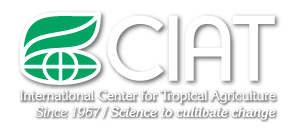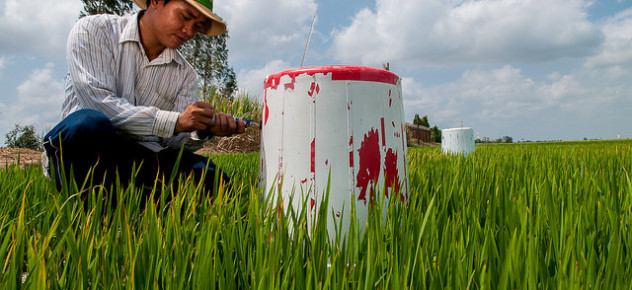CCAFS: On Track for Impact
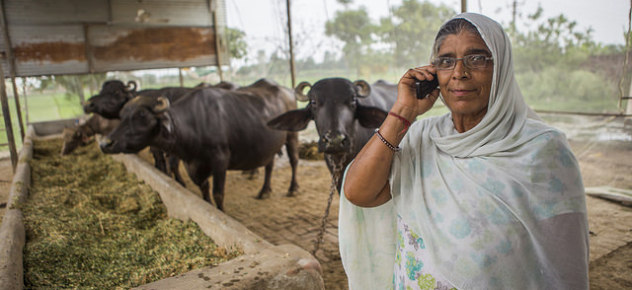
Kamla Devi, who is 56 years old, listens to messages on weather and climate-friendly crop practices. Credit: Prashanth Vishwanathan / CCAFS
The CGIAR Research Program on Climate Change, Agriculture and Food Security (CCAFS) underwent significant reorientation in 2014, with a sharpened focus on developing detailed theories of change and impact pathways, and ensuring that all activities are linked to clear indicators of progress. The program is on track to reach ambitious outcome targets by the end of 2015.
Climate change in the spotlight
In April 2014, the Intergovernmental Panel on Climate Change (IPCC) released its Fifth Assessment Report, which finds that climate change impacts are already evident in farming worldwide. CCAFS scientists played key roles, both by providing scientific input for the report, and by raising awareness of its findings and their implications for food and farming.
CCAFS scientist Andy Challinor, based at the University of Leeds, UK, was lead author of the chapter titled “Food production systems and food security.” CCAFS research is highly visible in this chapter, including estimates of livestock’s contribution to greenhouse gas emissions (GHGs) across the tropics, provided by the International Livestock Research Institute (ILRI).
As part of a major public awareness effort, CCAFS produced a summary of IPCC findings on climate change impacts and adaptation options for agriculture. Published within days after release of IPCC’s Working Group 2 report and accompanied by infographics that highlight key findings, the summary was downloaded over 18,000 times in 2014.
#ClimateChange and #farming – What the world faces (in one fab #infographic by @cgiarclimate ) http://t.co/dQQBJYlqJ3 pic.twitter.com/6GVc61yaPw
— Richard McLellan (@RichardMcLellan) December 3, 2014
In two major events co-hosted by CCAFS and partners, experts shared their views on the IPCC findings. An event on adaptation, held in London on 3 April, focused on agricultural growth, food security, and climate. An event on mitigation, held in Washington, D.C., on 16 April, identified opportunities for reducing GHGs in agriculture, while also enhancing its resilience and strengthening food security. In relation to the IPCC report, CCAFS work was covered by several media outlets, including the Guardian, Forbes.com, Deutsche Welle, the Hindu Business Line, and Xinhua News Agency.
Post-IPCC, we have missed the glimmers of hope on the ground http://t.co/gy4qGTXhCf — The Guardian (@guardian) April 11, 2014
Progress in UN climate talks
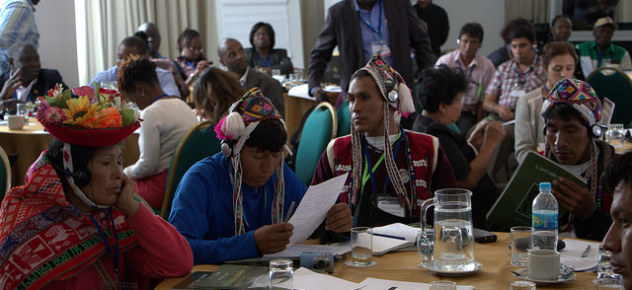
In conjunction with COP20 in Lima, Peru, CCAFS hosted a half-day event to raise awareness among farmers and youth representatives of agriculture’s status in the negotiations. Credit: Gian Betancourt / CIAT
A meeting of the Subsidiary Body for Scientific and Technological Advice of the United Nations Framework Convention on Climate change (UNFCCC), held in June 2014 at Bonn, Germany, led to several important developments. Parties to the UNFCCC finally made progress on agricultural issues, and delegates from 25 African countries discussed a shared vision and mechanism for coordinating country efforts to achieve climate-smart agriculture. The resulting Climate-Smart Alliance for Africa aims to trigger policy changes and investments that can transform the continent’s agriculture in a changing climate.
While not on the official agenda of the UNFCCC’s 20th Conference of the Parties (COP20), held in Lima, Peru, agriculture was still a hot topic, and CCAFS and partners were there to share experiences and insights on agriculture and food security. Our activities included a hackathon; official UNFCCC side events, including one with the Government of Kenya; sessions at the Global Landscapes Forum; and half a dozen seminars with farmers, youth, civil society, and policymakers.
Global alliance on climate-smart agriculture
Building on a 4-year effort with partners, CCAFS helped bring about the Global Alliance on Climate-Smart Agriculture (GACSA), which was launched in parallel with the UN Secretary General’s Climate Summit during September 2014. With more than 70 members from 20 countries, the Alliance brings together governments, civil society, and the private sector to share progress and lessons learned.
In addition to providing research outputs, CGIAR and CCAFS will play four distinct roles in the Alliance: (1) serving as a CSA standard bearer, (2) contributing to outreach, (3) expediting knowledge sharing, and (4) delivering expert advice. CCAFS has already co-convened the Alliance’s Knowledge Action Group in partnership with the Food and Agriculture Organization of the United Nations (FAO). CGIAR pledged to bring CSA innovations to half a billion farmers over the next 15 years.
Planning climate change adaptation in Ethiopia
To ensure its efforts are nationally relevant, the International Maize and Wheat Improvement Center (CIMMYT) is conducting climate change research in close collaboration with the Ethiopian Institute of Agricultural Research (EIAR) and other local stakeholders. The resulting outputs were used in developming Ethiopia’s National Climate Change Adaptation Strategy. Collaboration with stakeholders also helped strengthen Ethiopia’s climate research capacity. According to Andualem Shemeles, director of EIAR’s Biometrics, GIS, and Agro-meteorology Directorate, the research outputs generated in collaboration with CIMMYT and other partners have had a significant impact on the government’s strategies and policies.
Gender-sensitive adaptation
Policies for coping with climate change must take into account the different ways in which it affects men and women. To this end, researchers from Bioversity International helped develop a “gender-sensitive” program for climate adaptation in Colombia’s water-scarce Chicamocha Canyon. In the process, scientists found that water scarcity affectswomen mainly by reducing production of food for the family, while for men the central problem is lower cash crop yields and incomes. Researchers futher concluded that women can respond by adopting home gardens that require minimal watering, while for men, the solution is to test different droughttolerant crop varieties or species that are of commercial interest. This work represents an important first step towards ensuring that climate change policies address gender inequality.
Informing Colombia’s adaptation strategy
CIAT scientists are supporting Colombia’s effort to cope with climate change through a combination of scientific analysis and dialogue on technical and policy issues. In 2014, the country’s National Planning Department promoted such discussions and included subsectoral plans for climate adaptation in its 2015 budget. For this purpose, it used an impact study based on CIAT research dealing with livestock, biodiversity, and water resources. The study helped identify policy interventions with the coordinating committee of the National Plan for Adaptation to Climate Change through work undertaken in partnership with the National University.
Gender and social inclusion toolbox
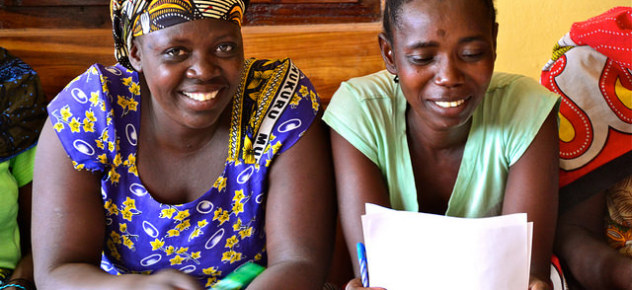
Participatory climate-service and information training in Tanzania. Credit: Cecilia Schubert / CCAFS
The toolbox was developed through a long-term partnership between CCAFS, the World Agroforestry Centre, and CARE International to promote the integration of gender and social perspectives into climate research and program development. The product of a participatory approach, it includes tools for mapping village resources, gauging perceptions of women’s empowerment, assessing climate information, and many other tasks. More than 60 partner organizations in 19 countries have co-developed and are using the toolbox in their programs.
